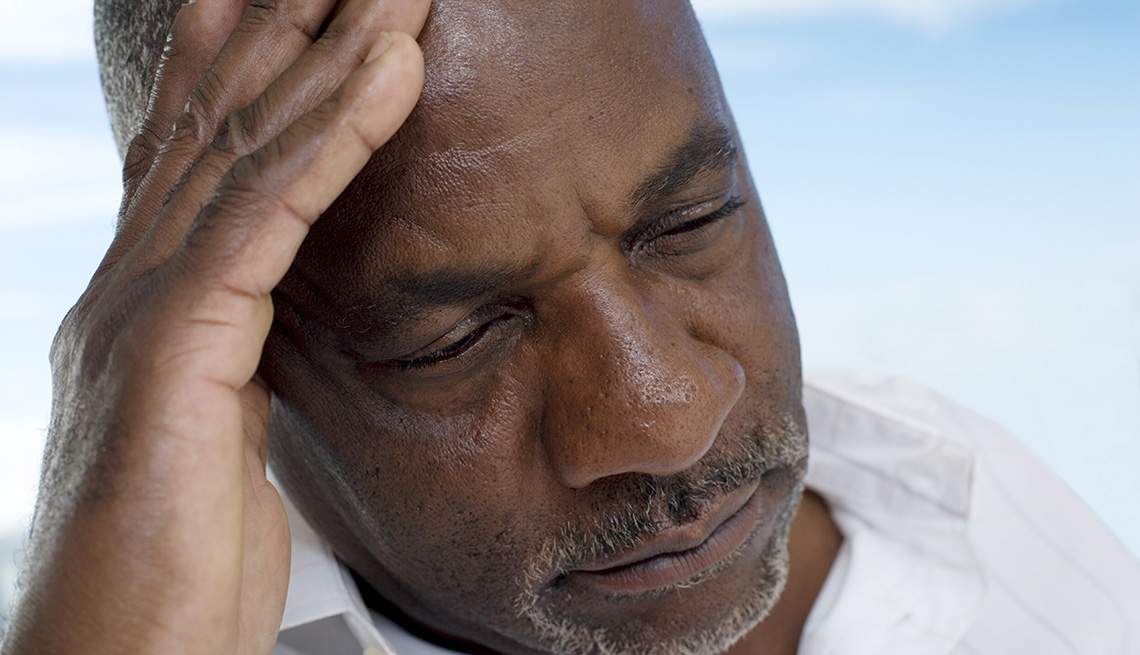
7 things everyone should know about depression
- Select a language for the TTS:
- UK English Female
- UK English Male
- US English Female
- US English Male
- Australian Female
- Australian Male
- Language selected: (auto detect) - EN
Play all audios:

3. SYMPTOMS OF DEPRESSION CAN LOOK DIFFERENT WHEN WE'RE OLDER Some of us are genetically predisposed to developing depression. If you have depression, your first-degree relatives —
parents, full siblings, offspring — have a two-to-three times greater chance of having it as well. But long-term stressful life situations and the challenges of aging — such as chronic
illness or increasing disability, isolation, the death of a spouse or struggling to adapt to retirement — can also increase someone's risk of developing depression. Unfortunately, the
disorder often goes untreated in older adults, in part because their depression can be challenging to diagnose. Their symptoms are often different than those of younger adults, says Ipsit
Vahia, M.D., interim chief of the Division of Geriatric Psychiatry , at McLean Hospital in Belmont, Massachusetts, and assistant professor of psychiatry at Harvard Medical School. Rather
than the “classic” symptoms of sadness, fearfulness or hopelessness, they tend to display symptoms such as irritability, a lack of motivation or energy, or a disruption in sleep patterns or
appetite. “There's also a tendency to start withdrawing,” says John F. Greden, M.D., founder of the University of Michigan Comprehensive Depression Center. “That's what families
notice first.” Many older adults — and even many clinicians — don't recognize these symptoms as depression, especially because they often overlap with symptoms of other health
conditions. Depression and dementia are especially easy to confuse, says Vahia. 4. DEPRESSION CAN AFFECT YOUR HEART "It's been fairly clear for the last 20 or so years that there
is a link between depression and heart disease, and the evidence continues to accumulate,” says Robert Carney, professor of psychiatry at the Washington University School of Medicine in St.
Louis, Missouri. Indeed, research appearing on the National Institutes of Health (NIH) website states that adults with a depressive disorder or symptoms have a 64 percent greater risk of
developing coronary artery disease, compared to those without depression. “Depression doesn't hold the same risk as, say, high cholesterol,” says Carney, “but it's close.” There
are a number of possible explanations. Among them: People who are depressed and those who develop heart disease seem to share certain inflammatory markers. Also, says Carney, “Depressed
people tend to have less heart rate variability. Their heart is not as responsive to changes in activity levels, and they tend to have higher heart rates overall, than people who are not
depressed. These are factors that can lead to a cardiac event.” Finally, there are the behavioral aspects of the disorder. Depressed people are more likely to be more sedentary, more likely
to be smokers, and less likely to follow the recommended dietary guidelines — all things that can lead to ticker trouble down the road. But according to a 2014 study from Indiana University,
early treatment for depression — before the onset of cardiovascular disease — may slice the risk of heart attacks (and stroke) by almost half. 5. ANTIDEPRESSANTS COMBINED WITH THERAPY SEEMS
TO BE THE MOST EFFECTIVE TREATMENT Antidepressant use among all ages jumped an eye-opening 65 percent between 1989 and 2014, according to the Center for Disease Control and Prevention. “But
medication isn't always warranted,” Sutor says. “With mild to moderate depression, there's good evidence that people can respond to certain types of psychotherapy, such as
cognitive behavior therapy.” CBT, as it's known, teaches new ways of thinking and behaving, and offers help in changing habits that may be contributing to depression.
